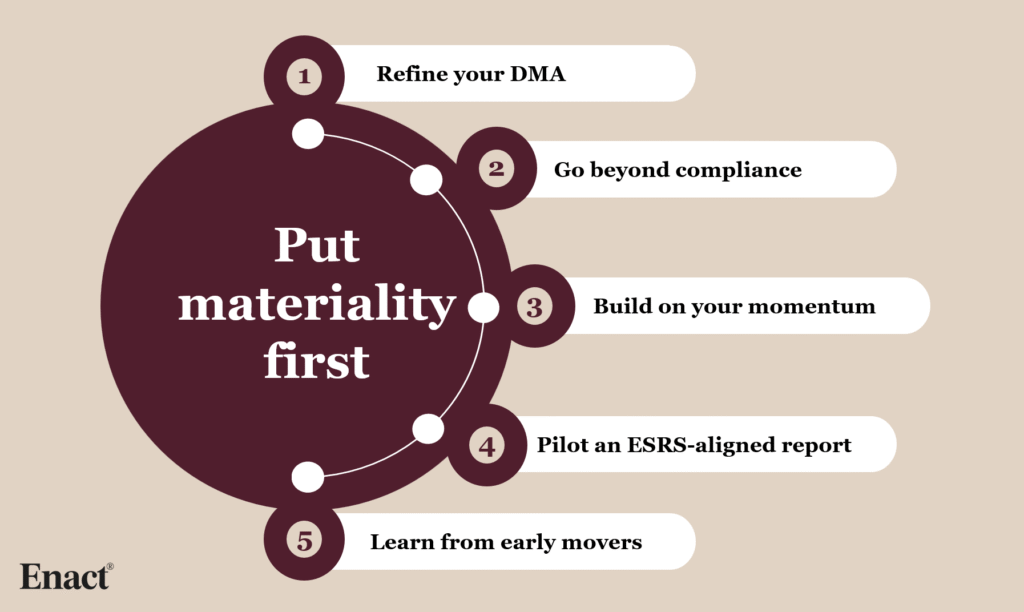EU initiatives are reshaping sustainability reporting. The Stop the Clock Directive delays requirements for non-listed large companies. The Omnibus proposes narrowing CSRD’s scope. ESRS amendments aim to simplify and clarify reporting requirements.
Even so, delays are no reason to stall. Companies should use this time to strengthen reporting capacity and build resilience. Here’s how to move forward with focus and impact.

Put materiality first
Double materiality remains the cornerstone of ESRS – and your strategy. Identify the impacts of your activities and the risks and opportunities for your business. Treat materiality as a decision-making tool: focus resources on hotspots, adapt your business model where needed, and let it guide your sustainability work.
1. Refine your Double Materiality Assessment
Your first DMA isn’t the finish line but the starting point to build a sustainable business strategy. Use this time to:
- Reassess hotspots in greater depth through a risk assessment and focus on salient issues
- Strengthen impact and risk management processes
- Expand or deepen stakeholder engagement
- Close gaps left in your initial assessment, for instance further data collection or involvement of specific stakeholders
2. Go beyond compliance
Transparency expectations are rising. Investors watch closely, especially on climate and biodiversity risks. Stakeholders demand more than compliance – they expect progress. Strengthen due diligence processes and show continuous improvement on environmental and social issues.
3. Build on your momentum
Sustainability teams have gained resources, cross-functional support, and better data collection systems. Don’t let this slip. Use your mandate to embed sustainability deeper in your business and create long-term value. Sustainable business is smart business.
4. Pilot an ESRS-aligned report
Turn the delay into an advantage:
- Use the proposed ESRS amendments as a blueprint.
- Publish a pilot ESRS-inspired report to uncover gaps and build readiness.
- Even if you fall outside CSRD scope, ESRS offers a credible, stakeholder-relevant framework.
Each iteration makes your reporting stronger and your strategy more credible.
5. Learn from early movers
Study wave 1 ESRS reports. Use tools like the Sustainability Reporting Navigator to identify best practices in your industry. If you’re outside CSRD scope, report what’s most material – quality over quantity.
In short, delays and scope changes does not mean reduced expectations. Stay focused on materiality, pilot reporting, maintain momentum, and refine your processes. Companies that act now will be more prepared, resilient, and trusted in the years ahead.
At Enact, we can support focusing your efforts on what truly adds value to your organisation. With our team of experts in human rights, value chains, reporting and strategy implementation, we support you to navigate regulations, help you look past compliance and hold your hand through strategic decision-making. From identifying what matters, to integrating it into business practice, we translate sustainability requirements into practical impact and strategic clarity.
Feel free to reach out to:

Kerstin Pettersson, Head of Enact Sweden, kerstin.pettersson@enact.se
Sofia Svingby, Senior Advisor Enact Group, sofia.svingby@enact.se

